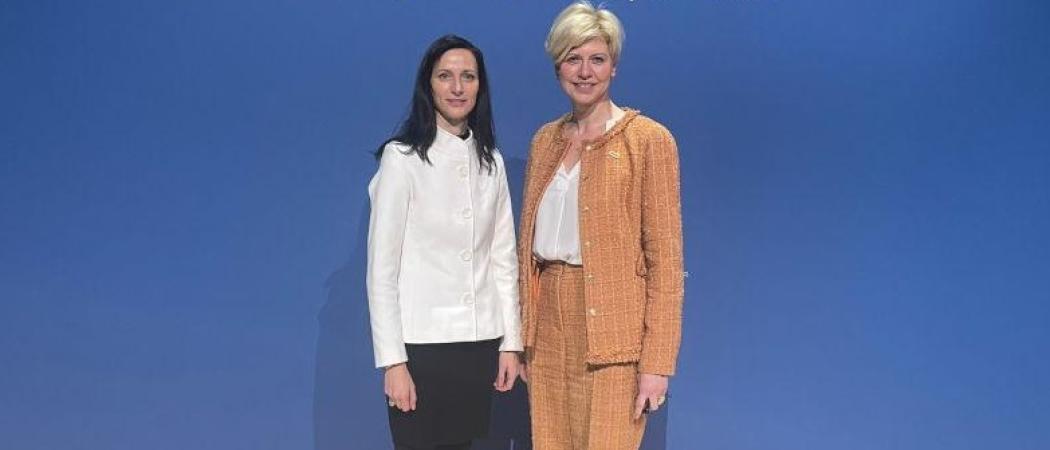Seven countries have signed up to a Commission initiative to help them in drawing up tailored R&I policies that make the most of EU programmes. Initial reaction is positive, but participants say implementation is what counts

EU research commissioner Mariya Gabriel and Latvian science minister Anda Čakša met in Stockholm earlier this year to kick off 'Enhanced Dialogue' on research and innovation policy. Photo: European Commission
A new initiative by the European Commission aims to replicate the concept underlying the European Semester - in which EU member states discuss and try to align their economic policies with EU rules - with a similar forum for research, development and innovation policies.
Since the launch of Enhanced Dialogues in 2022, seven countries have opted in: Croatia, Czechia, Estonia, Greece, Latvia, Lithuania and Slovenia. These are all Widening countries with a weaker R&D performance, but the initiative is open to all member states.
The project is in its infancy, and to date not much more has happened aside from launch events with the first volunteers. But although not stated officially, the goal is for all of the EU’s member states to get involved.
This will open the way for each member state to have a dialogue with the Commission about their R&D policies, with the Commission then acting as a go-between and relaying best practices and experience between countries.
Enhanced Dialogue is designed to be broader in scope than existing channels for policy discussions, such as the Policy Support Facility, through which member states can get advice on specific policy areas.
One specific objective is to help member states to better connect with EU programmes and projects, including the European Research Area, the New European Innovation Agenda and Horizon Europe’s Missions and partnerships. Another is to help member states in developing synergies with EU regional and development funds. It also gives member states flexibility to set their own objectives in terms of what they want to get out of the dialogues with Commission representatives.
It is early days, but Tomaž Boh, director general of the science directorate in Slovenia’s science and innovation ministry, is enthusiastic. “It’s a working progress, but so far we are quite satisfied with it,” he said.
“The European Semester is very useful for fiscal policy, social policy, but it’s our impression that when we start to discuss R&I, we’re almost at the end of the time for discussion,” Boh said.
A major upside is the fact that having representatives from the European Commission to visit the member state to discuss RDI policy encourages politicians from other ministries to get together. “When we had our meeting with the Commission, we had representatives from finance, energy, agriculture […]. It was a strong debate within this governmental circle,” Boh said.
The same happened when Greece hosted its launch event. Maria Christoula, director of the international scientific and technological cooperation directorate at Greece’s General Secretariat of Research and Technology, said it is “always a challenge” to bring different ministries together, and having the Commission there helped. “It was a good and open discussion, both in the formal and informal setting,” she said.
Delivering
While there is optimism among the initiative’s early adopters, everything now hangs on how it is implemented.
The concept allows quite a lot of flexibility for member states to choose those areas and aspects of R&D policy they want to build on. Slovenia for example, has chosen to prioritise improving hydrogen innovation and talent attraction and retention through the dialogue.
Greece, meanwhile is putting the initial focus on open science and on research careers. It has chosen four other areas, of Missions and partnerships, research infrastructures, green hydrogen and bringing science closer to the citizens, as topics it wants to pursue longer term.
Christoula said it was a tactical decision to focus the dialogue, to avoid having vague, sporadic discussions with the Commission that do not lead anywhere. “We signed up for specific actions [rather than] the whole agenda, not because of lack of ambition, [rather] we chose actions where we could do something and [deliver] results” she said.
Boh concurred, saying he did not want the Commission to come and present general information about different EU initiatives, but wanted concrete discussions to take place.
He also stressed the importance of as many member states signing up to the initiative as possible, as well as regular follow-up meetings with the Commission.
While only seven of the 27 member states have signed up to date, “We have good signs we’re going in the right direction,” said Boh. “But still, we’re not there yet. I see it as an important instrument, but it has to be developed in the appropriate way or it will remain just another box-ticking instrument.”





 A unique international forum for public research organisations and companies to connect their external engagement with strategic interests around their R&D system.
A unique international forum for public research organisations and companies to connect their external engagement with strategic interests around their R&D system.